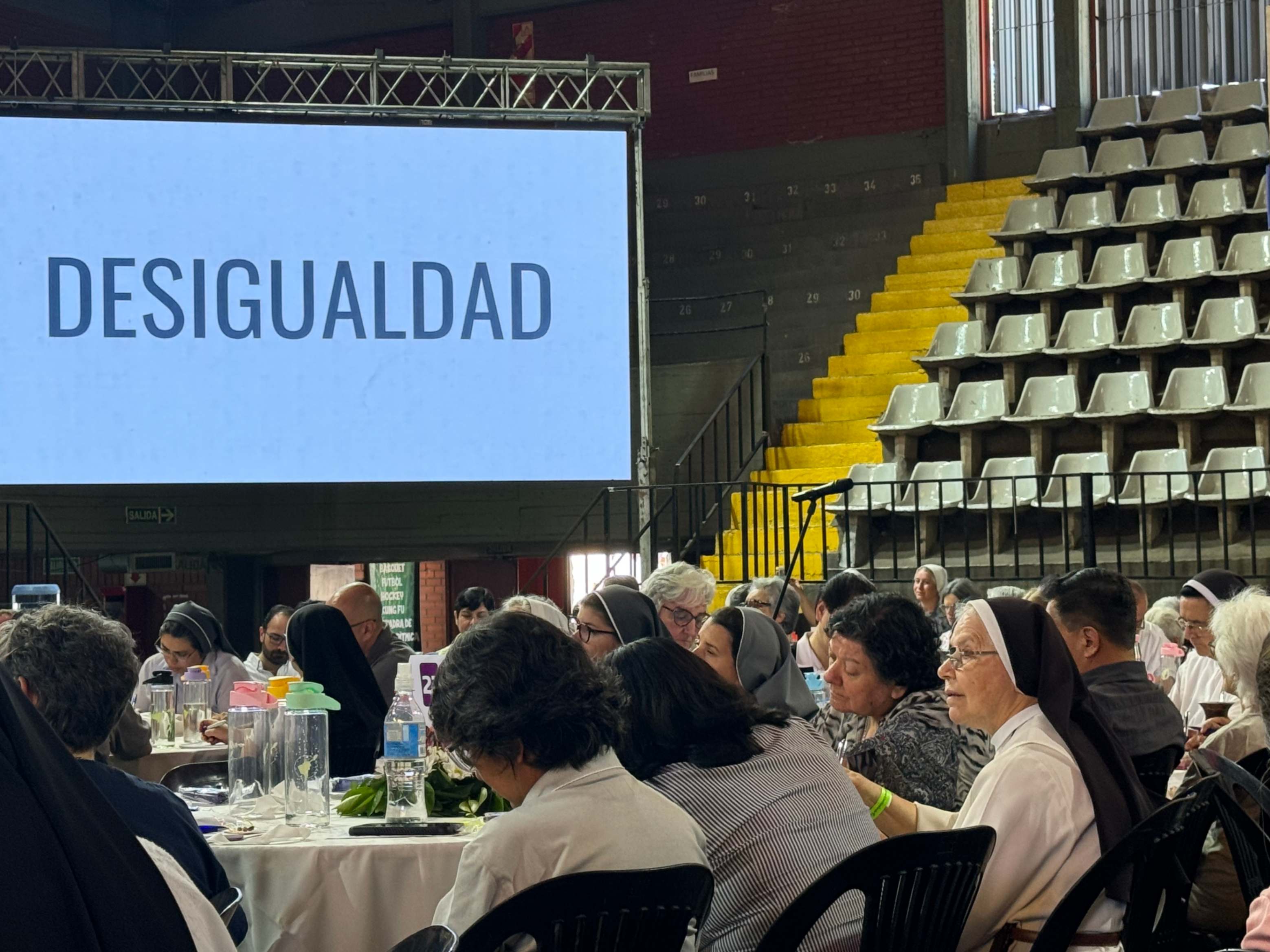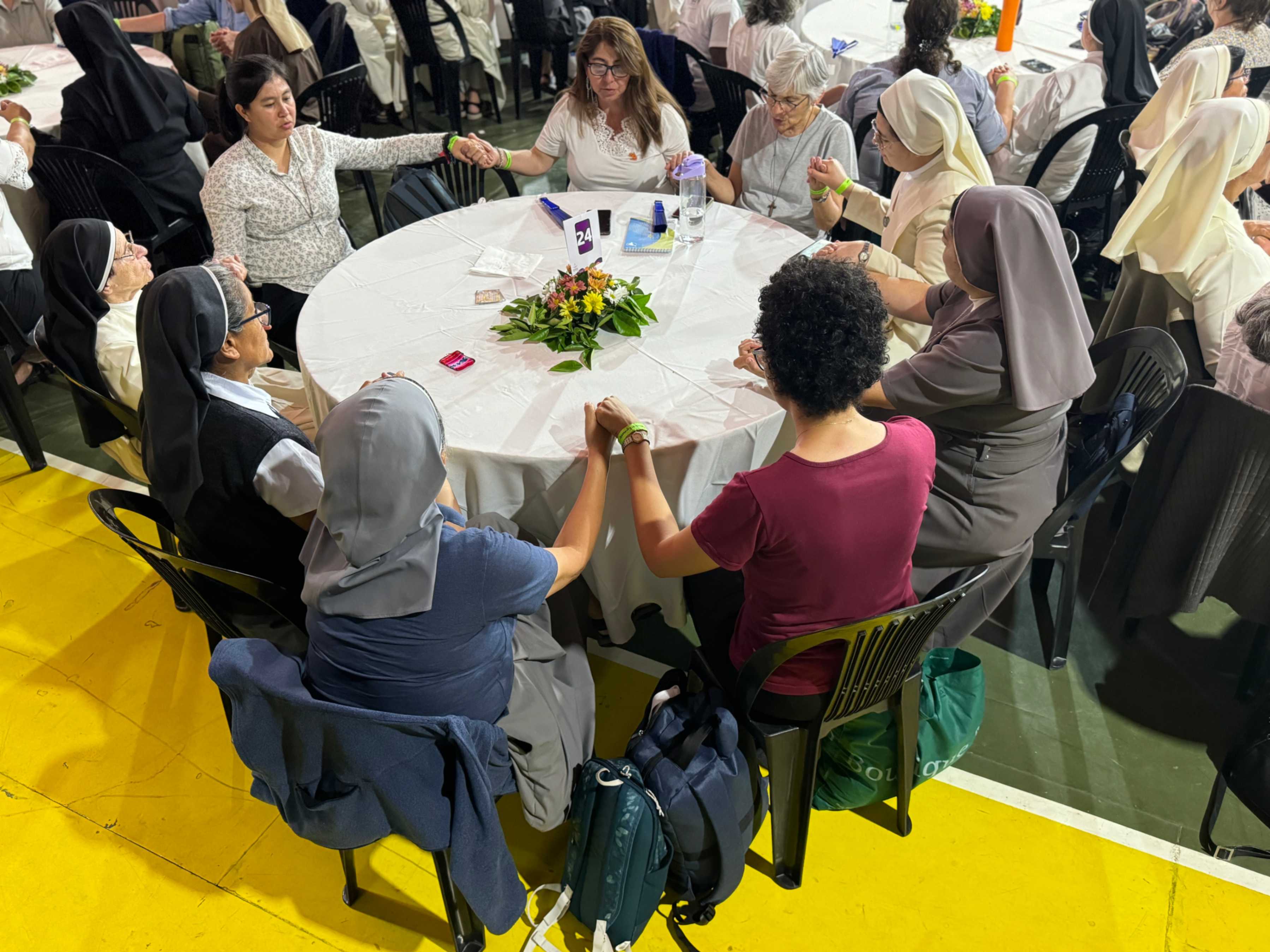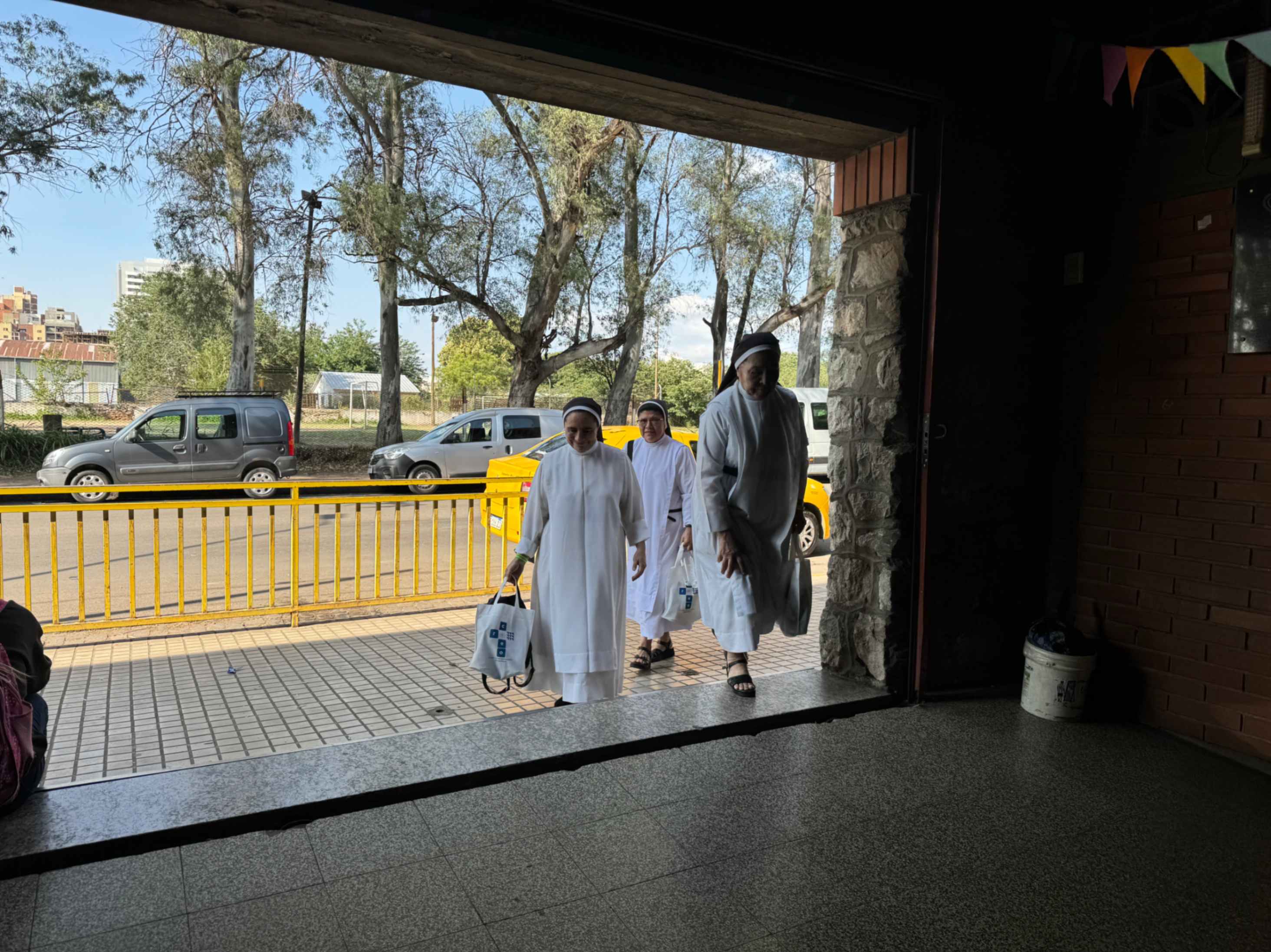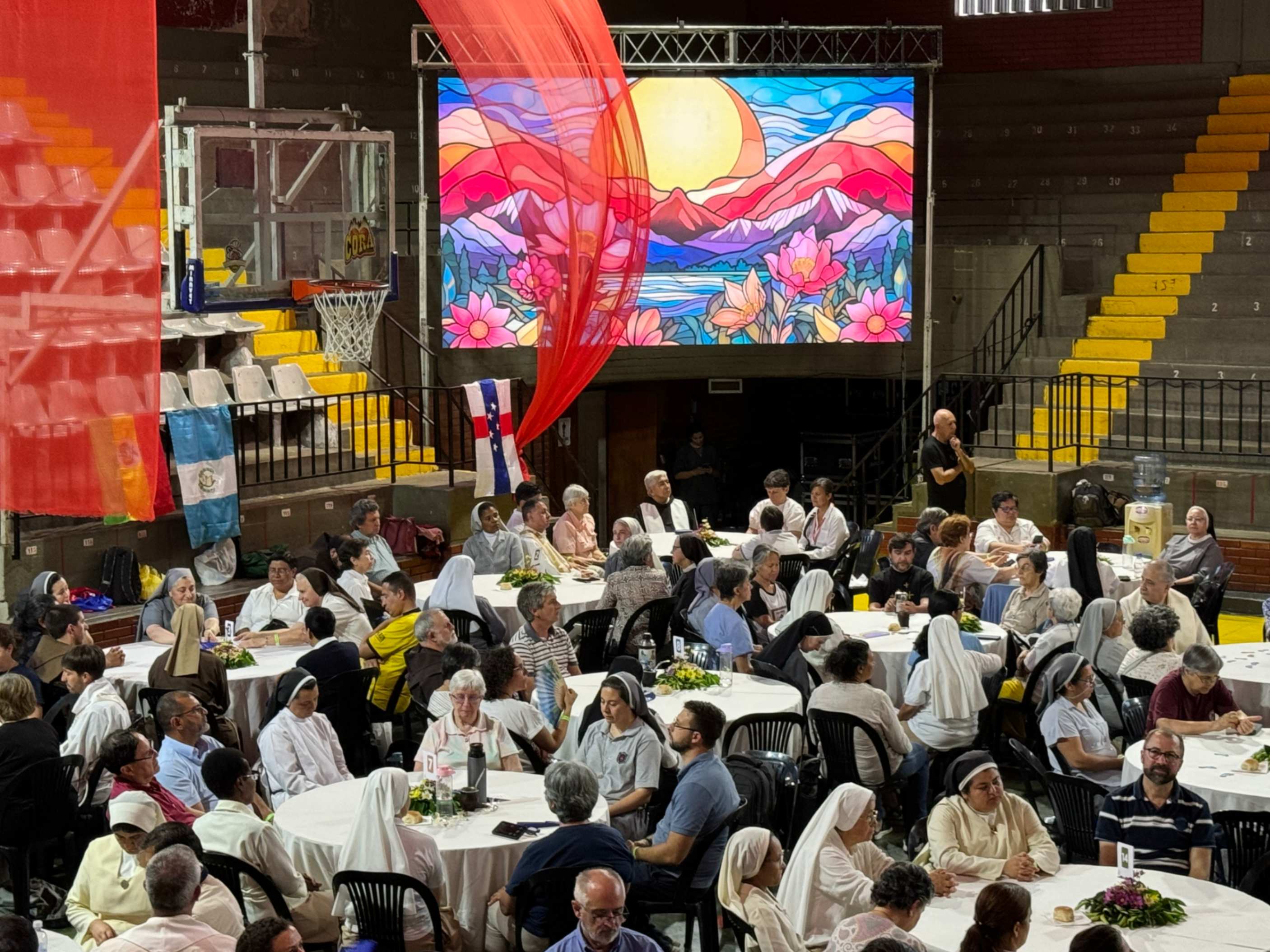
Attendees of the V Latin American and Caribbean Congress on Religious Life pray in silence Nov. 22, 2024, in Córdoba, Argentina. Some 400 religious from more than 20 countries participated in person and 600 by Zoom, said the Confederation of Latin American and Caribbean Religious, which organized the event. (GSR photo/Rhina Guidos)
The president of the largest group of women and men religious in Latin America and the Caribbean expressed her support Nov. 24 for religious life in Nicaragua as it lives out its mission under "tyranny."
Sr. Liliana Franco, president of the Confederation of Latin American and Caribbean Religious, known as CLAR, said, "to the religious men and women in Nicaragua, we are with you."
At the conclusion of the Nov. 22-24 meeting in Córdoba, Argentina, Franco urged the more than 1,000 attendees to be "sentinels of hope" in a world undergoing a "profound crisis," especially in Latin America.
Franco expressed her concern about "the weakening of democracies and rampant corruption" in the region, which "continued as we were gathered here. … The world kept crying out," she said.
Yet, as the conference was taking place, consecrated men and women from all over Latin America fed hungry migrants, patched up the sick, and helped victims of various types of abuses. Others spent their time petitioning for funding to help remote places build roads where there are none, said Franco, of the Company of Mary.
The V Latin American and Caribbean Congress on Religious Life brought together more than 1,000 participants — in person and online — who reflected on the social, political and ecclesial challenges in the region.
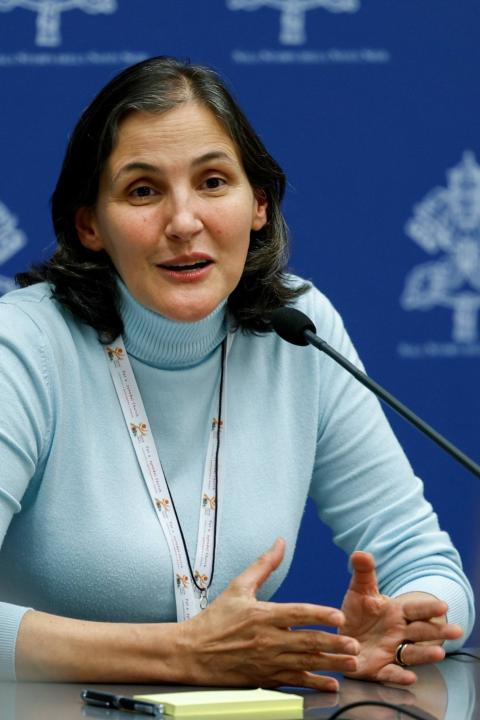
Sr. Gloria Liliana Franco, president of CLAR, in 2023 speaks during a briefing on the Synod of Bishops assembly at the Vatican. (CNS/Lola Gomez)
The mission of religious life continues, despite the strong challenges that the world presents, she added.
CLAR said more than 400 attended its "V Latin American and Caribbean Congress on Religious Life: Sentinels of Hope" and another 600 took part via Zoom, tuning in from more than 20 countries.
Many of those live or serve in "the most unequal region in the world," said sociologist Sol Prieto in a presentation to the group on Nov. 22, pointing to figures from the Inter-American Development Bank showing inequality plaguing Latin America: the richest 10% earn 12 times more than the poorest 10%; in Colombia, Chile and Uruguay, about 1% of the population controls between 37% and 40% of total wealth.
In Latin America, the place where a person is born, their skin color, ethnicity, their sex, determine, in large part, whether a person will live a life of poverty, Prieto said. In the face of this inequality, "political entrepreneurs sell you a narrative of why you are where you are" economically, Prieto said, and blame others for the negative results of inequality that include violence, poverty, lack of access to education, and other social ills.
Sr. Liliana Franco, president of CLAR, expressed concern about the "weakening of democracies" and the "rampant corruption" in Latin America, during the V Latin American and Caribbean Congress on Religious Life.
"At these high levels of inequality, [political entrepreneurs] sow the ground for polarization," which has resulted in low levels of support for democracy, and less trust in institutions, Prieto said. They have created a "them" vs. "us" narrative, facilitating the mistreatment of vulnerable populations, she added. And though many say the current problems are a result of the pandemic, "these [problems] were there before."
Fr. José Luís Loyola, second vice president of CLAR, said, "We live in uncontrollable and unsustainable times, of enormous and multiple crises, both global and local."
"Faced with such situations, it is worth asking where do we find hope?" he posed. "How can we be sentinels of hope in a world so broken and wounded?"
It is important to look beyond our earthly existence, said Loyola, superior general of the Missionaries of the Holy Spirit.
"Faced with these and other questions that trouble us, the Spirit invites us not to give up, not to give in. … Nothing will be lost," Loyola said.
Some religious men and women said they had experienced some of these tensions and situations on a daily basis in their ministries and in their lives.
A sister from Bolivia, through tears, said, "We live in total violence. I wonder how we are going to get out of this?" Another sister from El Salvador spoke of the rights that have disappeared because her government says that, to live in peace, it is necessary to suspend them, even for the innocent.
Participants also shared important issues in the lives of consecrated women and men, the difficulties religious communities face when they're not flexible, the need for self-care, and the need to be more inclusive, especially of minority groups. They heard a presentation by Sr. Jane Wakahiu of the Hilton Foundation, whose organization is helping sisters with grants for other women religious to learn how to care for sisters who are elderly or suffering from illnesses such as Alzheimer's. (The Conrad N. Hilton Foundation is also a major funder of Global Sisters Report).
Fr. José Luís Loyola, second vice president of CLAR, urged attendees of the V Latin American and Caribbean Congress on Religious Life not to lose hope in the face of the "uncontrollable and unsustainable times" that the region is experiencing.
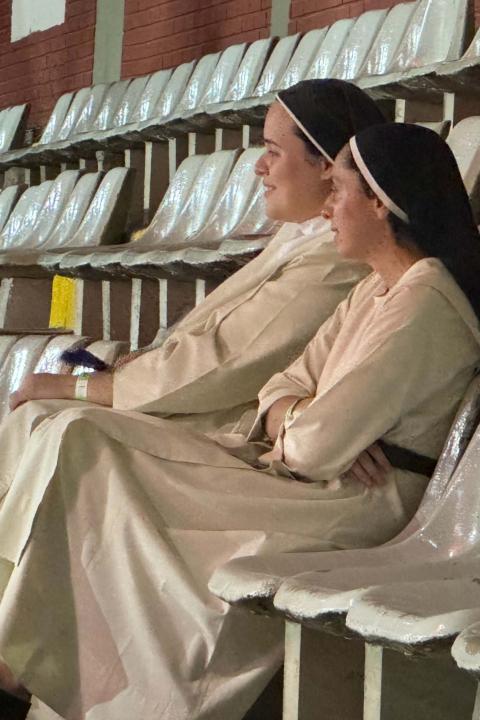
Srs. Paula Radichi, left, and Ariela Jara watch a dance Nov. 23, 2024, during the V Latin American and Caribbean Congress on Religious Life by CLAR in Córdoba, Argentina. The Mercedarian Sisters of the Child Jesus said the meeting had given them hope as they were able to meet and talk with women and men religious from various countries and of different ages. (GSR photo/Rhina Guidos)
Srs. Ariela Jara and Paula Radichi, both from Argentina, ages 27 and 28 respectively, said the discussions and presentations helped paint a true picture of what they will face throughout life as women religious with the Mercedarian Sisters of the Child Jesus, as they encounter and bring Jesus to others, especially in moments of adversity, they said.
Jara, in an interview with Global Sisters Report Nov. 24, said the gathering had given her "hope, just as the title [of the conference] that gathers us says," and it also had given her much to think about.
"The point is not to give in or look for closed-ended answers but to continue to search and seek," Jara said. "There is a variety of different religious women and men, of different ages, and I value the contributions of all. … It is useful for us to listen so that we do not forget the path we have been following."
But it was also a thrill to meet other young religious women and men who value their vocation "despite so many" questions, she said.
"Participating in the conference, it was also renewing, and [gave] hope," Radichi said. "It is nice to see how, in so much adversity, we are speaking the same language. The reality is super hard and touches us all in one way or another. And it's good that things are being talked about as they are because that's how change comes. … You can feel it here. You feel life, you feel the Spirit."
Between talks, the group shared coffee, dances, ideas, poetry, stories and words from those who contributed to religious life in Latin America, such as Dominican Fr. Gustavo Gutiérrez, who died in October, and retired Bishop Pedro Casaldáliga, a Claretian, poet and writer originally from Barcelona who died in Brazil in 2020. Both went through difficult times of militarism and high poverty, death and hunger in Latin America yet were able to speak out for the disadvantaged.
Franco said that women religious should focus on hope and the word of God in these times of adversity.
"We cannot fall into the temptation of paralysis," Franco said. "Staying shut inside our institutions makes us small; it shrinks us, and can even suffocate us."

